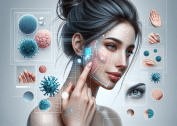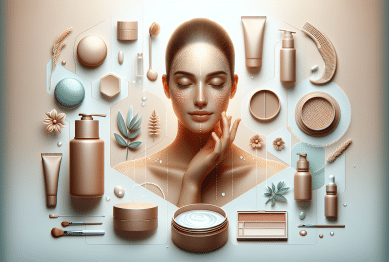Unlock the essentials of collagen—your skin’s natural support system—with this in-depth guide. Learn what really matters for glowing, firm skin, the science of collagen peptides, affordable ways to boost production, and what others consider before selecting supplements. Discover how this protein could influence your beauty decisions.
The Role of Collagen in Skin Health
Collagen forms the backbone of healthy, elastic skin, serving as its main structural component. This protein is found abundantly throughout the human body, making up around 75% of the skin’s dry weight. As time passes, collagen’s natural abundance can diminish, contributing to visible changes. Many people notice these shifts through the appearance of fine lines, sagging, or a less vibrant complexion as they age. Collagen’s role goes beyond just looks; it supports the skin’s ability to heal and protects it from environmental stressors. The desire for skin firmness and resilience often leads to curiosity about ways to support or restore collagen within everyday routines.
Interest has grown around using collagen-boosting products as part of a beauty or wellness regimen. Some individuals focus on dietary sources of collagen, like bone broth, eggs, and certain fish, aiming to encourage the body’s production from within (Source: https://www.hsph.harvard.edu/nutritionsource/collagen/). Others explore skincare products, such as creams enhanced with peptides or vitamin C, aiming for topical support. Researchers note, however, that while these products may have some benefits, the effectiveness depends on factors like formulation and absorption rates. The interaction between lifestyle, nutrition, and collagen supports a personalized approach to skin health.
Simple lifestyle practices can play a significant role in promoting natural collagen preservation. Avoiding excessive sun exposure, managing stress, not smoking, and maintaining a balanced diet may help prolong the skin’s natural elasticity. These interventions, while fundamental, should not be seen as a cure but rather as supportive habits that may slow the signs of aging. Ultimately, understanding collagen’s core functions allows for informed choices when integrating new products or routines into daily life.
How Collagen Supplements Are Made and What to Know
Many different forms of collagen supplements are available, including powders, capsules, and ready-to-drink beverages. Most supplements derive their collagen from animal sources such as bovine (cow), porcine (pig), or marine (fish). These proteins are processed into a hydrolyzed form—meaning they are broken down into smaller, more digestible peptides (Source: https://ods.od.nih.gov/factsheets/Collagen-Consumer/). The aim of hydrolyzation is to increase absorption in the body, making it easier for collagen peptides to be utilized in tissues like skin, hair, or joints. This process may help collagen supplements fit conveniently into busy routines and provide an accessible option for those seeking to address skincare concerns from the inside out.
While supplement popularity rises, scientific perspectives on their benefits are nuanced. Some small, short-term clinical trials have shown modest improvements in skin hydration, elasticity, and appearance after consistent collagen peptide intake (Source: https://www.ncbi.nlm.nih.gov/pmc/articles/PMC6835901/). However, not all studies reach the same conclusion. Researchers emphasize that results may differ depending on a person’s age, baseline skin health, and dietary habits. Collagen supplements are usually considered safe for most healthy adults, yet those with allergies or dietary restrictions should review ingredient labels carefully. Seeking advice from qualified professionals may also help determine if a supplement suits specific wellness goals.
Not all collagen products are created equal. Quality, purity, and sourcing practices can vary widely between brands. Third-party verification and transparent labeling offer reassurance for those investing in supplements. In some regions, regulatory oversight is limited, so consumers often turn to independently published reviews or medical opinions to guide choices. The rising demand for marine collagen, popular for its smaller particle size and perceived sustainability, is another option to consider. Each form has unique properties, and learning to decode product claims supports more confident decisions for personal care routines.
Foods That Support Collagen Naturally
Food selection plays a crucial part in natural collagen support. Certain amino acids—proline, glycine, and lysine—found in protein-rich foods help the body synthesize more collagen (Source: https://www.health.harvard.edu/blog/collagen-supplements-are-they-beneficial-2019081517660). Bone broth, made from simmering animal bones and connective tissue, is often highlighted for its rich protein and collagen content. In addition to animal sources, eggs (especially egg whites), fish with skin on, and chicken are also seen as good options for supporting collagen production.
Vitamin C acts as an important co-factor in collagen synthesis and is found in citrus fruits, strawberries, bell peppers, and broccoli. Including a variety of colorful vegetables in the daily diet could support the body’s natural mechanisms and maximize the value of collagen-boosting efforts. Minerals such as zinc and copper, present in nuts, seeds, and shellfish, also help promote optimal collagen formation. By combining several nutrient sources, a more holistic approach to skin health is possible, giving your body the building blocks it needs to naturally renew itself.
Aside from protein and vitamin C, hydration remains a critical factor for the skin’s appearance and overall function. Water intake, paired with a balanced diet, works in harmony with collagen for maintaining elasticity. Many nutritionists recommend minimizing ultra-processed foods, as high sugar content can negatively impact collagen structures. Simple adjustments to daily menus might help delay or reduce the onset of wrinkles and improve skin texture over time—an approach that emphasizes nourishment from within as a pillar of healthy aging.
Understanding Collagen Peptides and Their Uses
Collagen peptides, sometimes referred to as hydrolyzed collagen, are a more digestible form of the protein and a key focus of skincare research. These smaller molecules are more easily absorbed through the gut and transported to targeted tissues (Source: https://www.ncbi.nlm.nih.gov/pmc/articles/PMC5793325/). As collagen peptides make their way into the bloodstream, they may stimulate production and renewal, supporting elasticity and hydration levels. The convenience of tossing collagen peptides into coffee, smoothies, or soup makes these supplements appealing for busy lifestyles.
Several studies suggest a range of potential wellness benefits when collagen peptides are consumed alongside a balanced routine. Some findings highlight improved moisture retention, reduced wrinkle depth, and strengthened nail and hair structure. However, health authorities remind people that responses can vary and effects may not be immediately noticeable for everyone. Dosage, frequency, and the presence of other nutrients—such as vitamin C and hyaluronic acid—can all influence outcomes. Getting a sense of what’s typical can guide expectations and inform future decisions when considering collagen supplements or peptide powders.
The uses of collagen peptides extend beyond beauty, with studies investigating impacts on joint health, muscle recovery, and even gut support. For those juggling multiple wellness goals, collagen peptides may become an all-in-one solution. Transparency about source materials, manufacturing process, and product certifications is especially important in this growing market. Individuals with food allergies or restrictive diets should review sourcing details carefully before making a selection. Maintaining a realistic outlook can empower informed choices that are both practical and beneficial for skin health and beyond.
What Influences Collagen Loss and Tips for Preservation
Collagen degradation is influenced by both chronological aging and environmental factors. Daily exposure to ultraviolet (UV) light is widely considered the leading preventable cause of accelerated collagen breakdown (Source: https://www.aad.org/public/everyday-care/sun-protection/sunscreen/how-to-apply). Using broad-spectrum sunscreen, wearing protective clothing, and seeking shade can help limit UV-related damage. Pollution, tobacco smoke, and chronic stress are also environmental contributors that may hasten collagen depletion when not addressed.
Nutritional habits and hydration are inseparable from the skin’s ability to repair itself and create new collagen. Maintaining a balanced, nutrient-dense diet supports the skin from the inside out. Health professionals often recommend limiting sugar intake and processed foods to prevent toughening of the collagen fibers—a process known as glycation. Wins in skincare sometimes rely less on expensive products and more on routine daily choices that favor preservation and renewal.
Other practices, like avoiding harsh cleansers, moderating exfoliation, and using moisturizers with antioxidants, may protect the skin’s collagen reserves. Consistent, gentle rituals seem to provide more benefit than occasional extremes. Staying informed about ingredient safety and evolving scientific insights allows for tailored, effective routines. Taking small steps—like adding a vitamin C serum or a collagen peptide powder to an existing routine—can be empowering for people seeking gradual long-term improvement.
Choosing Between Collagen-Boosting Strategies
With so many collagen products and natural strategies available, deciding on the right option can be challenging. Some people prefer relying on whole-food sources, bolstering their diets with collagen-rich meals and vitamin-packed vegetables. Others research topical products, like serums containing peptides or retinol, and evaluate ingredient transparency before committing. Understanding how different collagen sources work—supplements, food, or skincare—enables a customized approach that blends convenience with personal values (Source: https://www.ncbi.nlm.nih.gov/pmc/articles/PMC3583892/).
The cost of collagen solutions can vary greatly. While some clinical-strength products command hefty price tags, there are often more affordable options available at local supermarkets or online retailers. Community reviews and independent testing are key resources that help people evaluate safety and efficacy, minimizing the risks of unproven claims. It’s possible to start small, such as adding collagen peptides to a favorite morning beverage or testing one new skincare product at a time. This step-by-step approach can help build trust and deliver clearer results.
Ultimately, choosing a collagen-boosting strategy means balancing goals, preferences, and tolerances for risk or cost. For the best possible outcomes, combining several approaches—such as fortifying diet, protecting from UV, and selectively supplementing or treating topically—may be the most practical. Being an inquisitive consumer, staying up-to-date on scientific findings, and regularly assessing what works best personally ensures ongoing success in the journey toward healthy, vibrant skin.
References
1. Harvard T.H. Chan School of Public Health. (n.d.). Collagen. Retrieved from https://www.hsph.harvard.edu/nutritionsource/collagen/
2. Office of Dietary Supplements, National Institutes of Health. (n.d.). Collagen. Retrieved from https://ods.od.nih.gov/factsheets/Collagen-Consumer/
3. Sibilla, S. et al. (2015). An overview of the beneficial effects of hydrolysed collagen bioactive peptides on skin properties: Evidence from in vitro and in vivo studies. Journal of Cosmetic Dermatology, 14(4), 291-301. Retrieved from https://www.ncbi.nlm.nih.gov/pmc/articles/PMC6835901/
4. Harvard Health Publishing. (2019). Collagen supplements: Are they beneficial? Retrieved from https://www.health.harvard.edu/blog/collagen-supplements-are-they-beneficial-2019081517660
5. Zdzieblik, D. et al. (2017). Collagen peptide supplementation in women: Current evidence and emerging trends. Nutrients, 9(9), 1001. Retrieved from https://www.ncbi.nlm.nih.gov/pmc/articles/PMC5793325/
6. Baumann, L. (2007). Skin ageing and its treatment. Journal of Pathology, 211(2), 241-251. Retrieved from https://www.ncbi.nlm.nih.gov/pmc/articles/PMC3583892/










 You Won’t Believe How Smart Homes Are Changing Daily Life
You Won’t Believe How Smart Homes Are Changing Daily Life 

